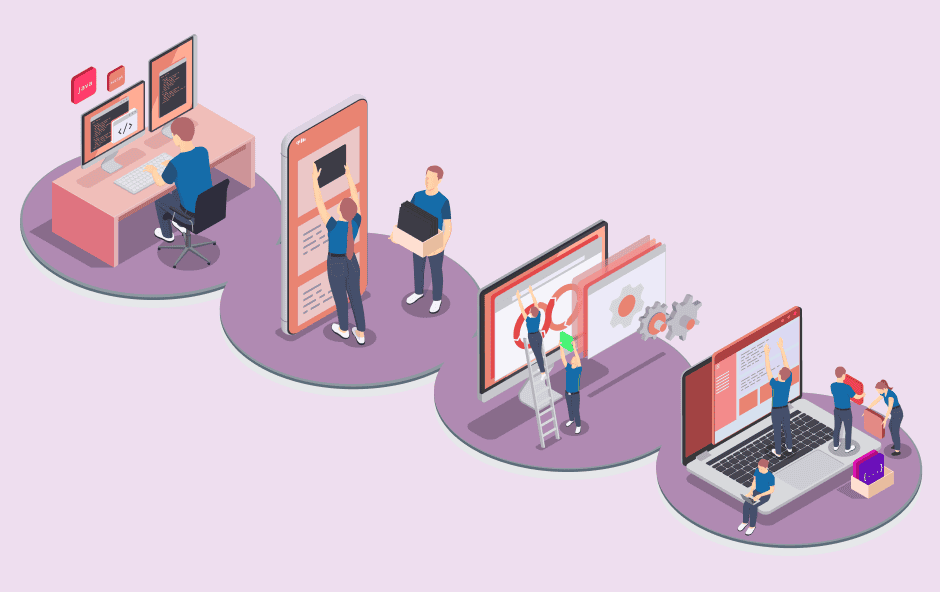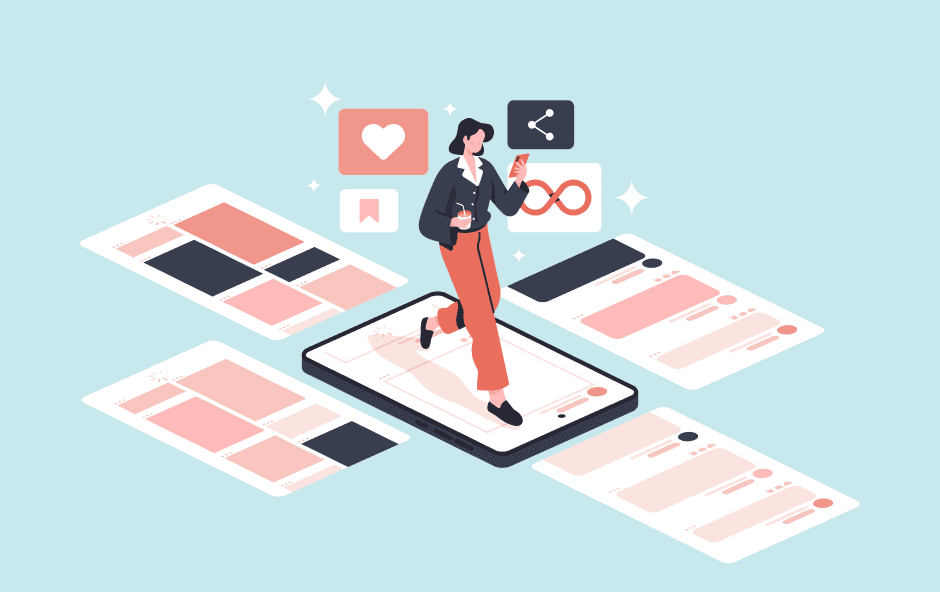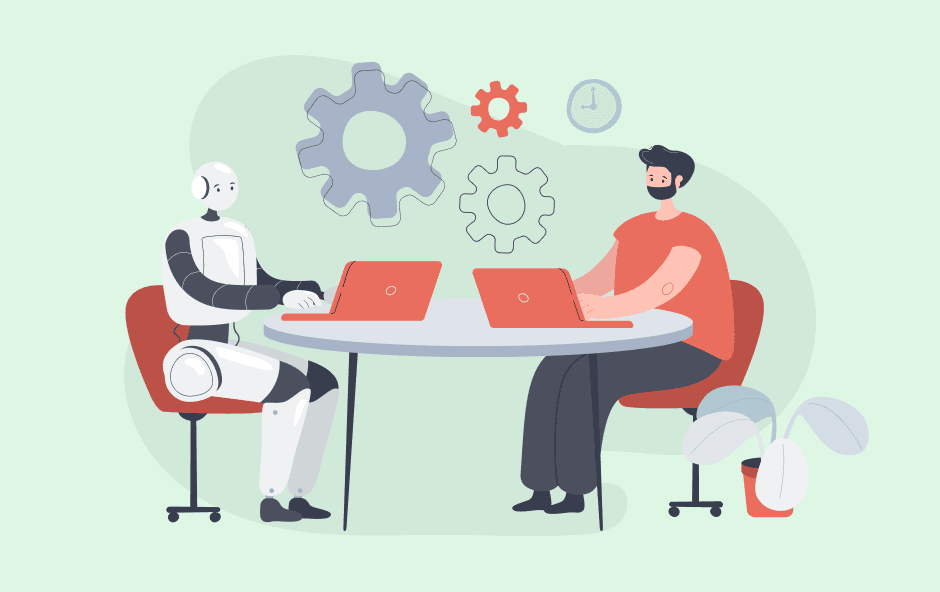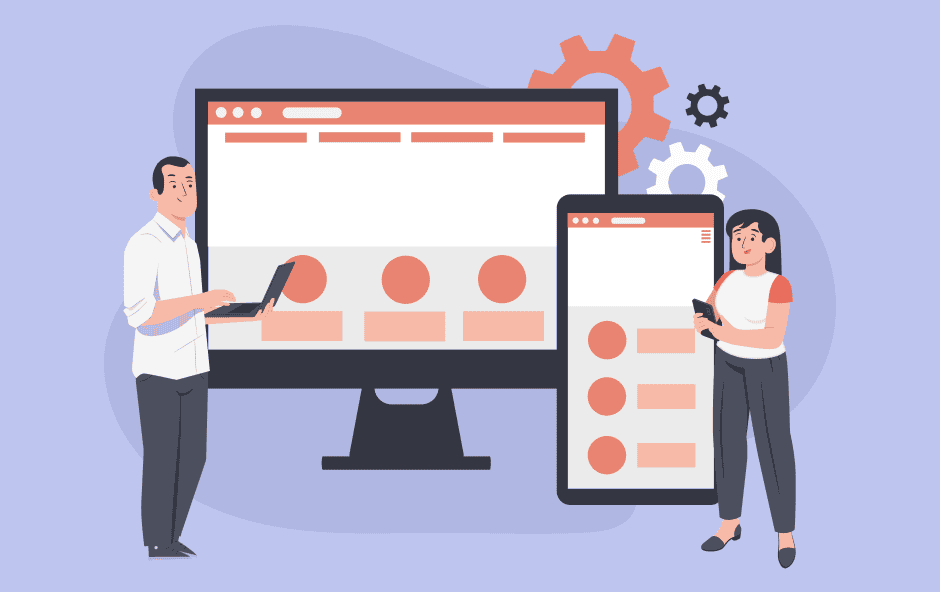You see them everywhere: smartphones. When stepping onto the train, when stepping into a waiting room, or during lunch break. One thing is very noticeable: (almost) everyone has a smartphone in their hand.
Android and iOS operating systems own 99% of the market in 2020. This means that organizations that want to develop an app have to choose between these two platforms or create an app that is compatible with both. In this article, we’ll further discuss the consequences and differences between Android and iPhone for app development.
Differences between iPhone and Android
There are clear differences between the two big players in the smartphone and app market:
1. Market share
The clear market leader of the two is Android: the open-source operating system of Google. The power of Android is its affordable entry-level model and its operating system that functions on multiple smartphone models and manufacturers. Manufacturers of smartphones, including for example Samsung and Huawei, don’t have to pay license costs to Google. This is the reason why the Android operating system is on 60% of all smartphones in the Netherlands. The second place goes to iOS, this has to do with the popularity of the iPhone and iPad. Together, Android and iOS own broadly 99% of the smartphone market (Statcounter, 2020).
2. Users
As mentioned above, Android has a bigger market share. However, iOS-users in general have a higher income and educational level. Besides, iPhone-users are more active on their smartphone.
3. Revenue generation
iPhone-users spend on average more time on apps and are more willing to spend money on them (New York Post, 2018). Android-users compensate for this with their market share.
The consequences for app development
There are five differences between iPhone and Android when talking about app development:
- The operating system: iPhone makes use of the closed operating system iOS and Android makes use of the open operating system Android.
- The programming language: for iOS native you program in Swift or Objective-C and for Android Native you program in Java or Kotlin.
- User Interface (UI) elements: iOS has stricter regulations compared to Android on what can and cannot be done with the UI.
- Screen size and resolution: iPhones have three different types of resolutions, while Android devices come with a big scale of screen sizes with a broad scale of screen resolutions.
- Navigation: iPhones in comparison to Android don’t use a ‘’back button’’, whereby users can return to the previous page.
Difference between the Google Play Store and the Apple App Store
Android-users use the Google Play Store to download apps while iPhone-users use the Apple App Store to download apps. There are many differences between the two app stores and each platform has its pros and cons. The cost for launching an app in the App Store costs $99,- per year while in the Play store you pay a one-time fee of $25,-. Besides, it takes longer to launch an app in the App Store than in the Play Store. The reason for this is that all apps are being checked manually. When the app doesn’t comply with all guidelines, it has to be resent to Apple after processing feedback, which takes time. Apple follows a 48 hour review time when the app is live after acceptance. In the Play Store, you have an answer in 24 hours, usually, this takes 2 to 3 hours.
Native Android and iPhone apps
A challenge when developing a native app for Android and iOS is to make sure that the app has all the same features on both platforms. Because of the differences between the two platforms, it is important to develop the apps in the specific characteristics of iOS and Android. Apple has established more rules with its iOS platform about what is and isn’t allowed. This makes that certain User Interface (UI) elements are limited in their appearance. For example, the standard keyboard of iOS or the way the time and date is selected.
The app development for an Android device is the complete opposite. Instead of one specific User Interface and associated functionalities, Android only gives advice and instructions on how UI-elements should look and operate. The disadvantage of the flexibility of Android is that the platform is fragmented by different smartphone models and different types of operating systems. The challenge that comes with developing an app for Android is to make sure that the app appears and functions the same on every device.
With the 99% rule in mind, it’s logical to choose for a native app on Android and iOS. There are multiple opportunitoes for the development of the Android operating system as well as the iOS operating system.
The advantages of a native Android or iPhone app
Native app development offers multiple advantages:
1. User-friendliness
Native apps are specifically developed for one platform which makes them perfectly compatible with the platform itself. When making a native app you can use the user interface elements from Apple and/or Android. This way users will get used to the app quickly.
2. Strong performance
Because the app is already downloaded, there is almost no need for it to load which increases its speed. Besides, native apps are programmed for one specific platform with its own programming language. This causes native apps to be very fast.
3. Offline availability
Because the app is downloaded in the app store beforehand, a lot of data will be available offline as well.
4. Maximized functionalities
A native app can be used with all features of a smartphone. For example, the camera, GPS, notifications, Bluetooth, or microphone.
5. Integration possibilities
Native apps offer good integration possibilities with other apps to exchange data. This makes for example that contacts from the users’ phone can be read and external data can be loaded.
6. Safety
Native apps have to meet the safety regulations of their platform. This makes a native app, in general, safer than a hybrid or web app.
7. App Store Optimization (ASO)
With App Store Optimization (ASO) you can make sure your app will appear in the spotlights.
The disadvantages of a native Android or iPhone app
Despite the many advantages, native apps also have some disadvantages:
1. Separate development per platform (iOS and Android)
The biggest disadvantage of native apps is that the app has to be developed in two separate program languages and development environments.
2. Costs
Because development for multiple operating systems is necessary, the starting costs of developing a native app are often higher.
3. Dependence on Google Play and App store
Native apps are dependent on the Google Play Store and the App Store because they have to approve the app before it appears on the platform. Furthermore, updates also have to be approved.
Android and iOS app development
Our conclusion is that app development for Android and iOS does not fit the narrative of ‘’one size fits all’’. To develop a successful app on Android and iOS it is important to adapt the design to the characteristics of the operating system. This way, apps will become better eventually and will be usable for a longer period of time. Qualitatively developed apps will give you, the client, the results you desire.
Best case scenario, you would like to develop an app for Android and iOS to reach the most users. Sadly, this is not always possible, in case of a deficiency of budget or time. In that case, a hybrid app or a PWA (Progressive Web App) could be a solution. Read more about hybrid apps or PWA’s.
Do you want to know if a native app is the right choice for your organization? Feel free to contact us, and we will gladly talk with you.









